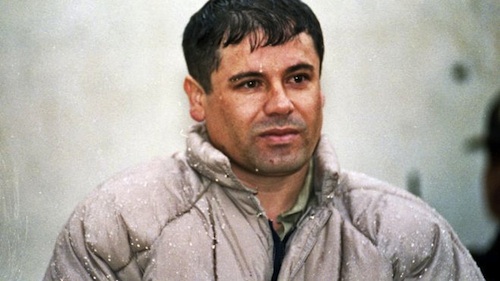Here is Forbes’ list of the 100 most powerful people in the world; the big news here is that Putin unseated Obama at No. 1. That shouldn’t really be big news: Russia is about to be at the forefront of the world (Olympics, World Cup), and, oh, they own the rights to the Arctic, essentially. Plus, Putin is a well-documented bad-ass.
Missing from the top of the list, for a fairly logical reason (you don’t want to glorify the gaining of power by illicit means, which is only a teeny bit ironic having Putin at No. 1), is El Chapo Guzman. He’s down at No. 67, and actually dropped this year (he was No. 63 in 2012).
I’m not even sure where to start with El Chapo. He’s essentially the most wanted man in Mexico, public enemy No. 1 in Chicago (he’s likely never set foot in the city), and might be more skilled at the global supply chain than most Fortune 100 companies. He is the poster boy for ‘deviant globalization’ and no one can seem to catch him. I consider myself a fairly ethical person, although I’m still deeply intrigued by cartels. This is what I don’t get: to run a successful cartel essentially, as noted just above, requires the logistical know-how that a place like Wal-Mart would deeply value. Instead of coordinating trucks and making legit money (well, mostly legit), you’re moving drugs and ordering people to be killed … but the base function of the job (getting products to the right place, engendering loyalty, etc.) are similar. So what makes a person embrace the darker side of it? El Chapo’s situation is especially interesting, because at age 36, he still was only a bit player in the whole game. Now he is the game.
Like Gus Fring, El Chapo has a reputation for simply hiding in plain sight. That’s tough to do when your crew is responsible for about 80 percent of the drugs flooding Chicago, 80 percent of the U.S. meth/synthetic trade, and may have a market share of about 60 percent. Then again, it might be fairly easy to do when you have enough control to essentially shut down an Ecuadorian prison when your enforcer gets locked up. This article gives a few clues about his operational style — it’s more cell-based than consolidated power in a given region, which probably helps with managing loyalty (if someone runs a region and flips on you, that’s theoretically more costly). You can argue, as Salon has, that El Chapo has ‘won’ the drug war. He may be getting explicit, direct support from the Mexican government, to boot.
Possibly the most amazing stats when thinking about El Chapo? First: at his current age, Pablo Escobar had been dead for 10 years already. This is not a middle-aged man’s game, but El Chapo is doing just fine. Second: none of his top people have ever really flipped on him, or been caught. The closest might be some members of Ismael Garcia’s family. Meanwhile, Pablo Escobar’s top enforcer from back when, “Popeye,” is in jail these days and admits El Chapo will someday fall (he also claims El Chapo doesn’t have the criminal mind that Pablo did).
When you watch this video, whether or not you know Spanish, try to imagine that this guy has killed about 300 people by his own hand:
The war on drugs is somewhat of a farce currently; even if El Chapo were to be caught or killed tomorrow, drugs would still enter the United States (and other G8 countries) at a rapid rate. I don’t know if that’s ever going to change. It’s hard to escape the potential money you can make. Sometimes I do wonder, though — El Chapo at 36, in that jail. When he finished that stint, his life could have gone in two distinct directions. Obviously this one has been more lucrative (if secretive), and perhaps that’s the goal … but could anything have happened, could someone have come along and convinced him to go a different route? Phrased another way, is the key to winning ‘the war on drugs’ just more about showing people their options? That seems extremely simplistic, I know, but I can’t see any true policy approach that would work.

3 Comments
Comments are closed.